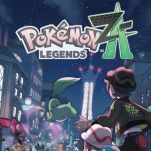Consume Me Can Be a Bit Too Autobiographical

CW: This review contains discussion of disordered eating and body dysphoria.
Playing Consume Me is like running on a too-fast treadmill. It amps up quick—barraging you with a constantly shifting collage of tooth-rotting visuals—and maintains its ruthless pace, leaving you with no choice but to keep up. Beneath the cheery, cutesy aesthetics lies the ugly core of the game: the eating disorder that its protagonist, Jenny, suffers from.
Consume Me is a memoir told through a collection of mini-games that abstract the behaviors of a teenage girl, including putting on makeup, folding laundry, studying, and unhealthy dieting. We follow Jenny from the summer before her senior year of high school to college, with an epilogue a decade later, as she manages school, relationships, and herself.
The game portrays the balancing act of Jenny’s diet and responsibilities by utilizing RPG mechanics; every day you have to maintain your Joy, Energy, and Guts levels, all while staying under your allotted daily Bites (the developers opted to use a fictional unit system rather than calories to prevent triggering players, to dubious success) and meeting your weekly goals, which vary from chapter to chapter. You have a certain amount of Free Time every day, during which you can choose to complete activities that impact your stats. If, for instance, you do poorly in the Lunch minigame and exceed your Bite count, you must spend one of your Free Time slots doing an exercise minigame to get back on track. If you fail to meet any of your mandatory goals—which always includes dieting—you will hit Game Over and have to start the day or chapter over.
While the core gameplay loop of Consume Me centers around Jenny’s dieting, the narrative is written in broader strokes, without paying much mind to her disordered eating—a decision which ultimately undermines both aspects of the game.
I am fortunate to not have personal experience with disordered eating, but I have struggled with body dysphoria my whole life, and see a lot of myself in Jenny. I empathize with her discomfort toward her naked body—I also admire how confident she is when picking outfits every morning, as I’ve always disliked how clothes hang on my own body.
As I progressed through Consume Me, successfully keeping Jenny under her Bite par and spending a Free Time on Aerobics if I went a little over, I was abuzz with the positive feedback I received from the game. I felt proud and accomplished, like I was doing a great job taking care of her. Of course, this is how destructive behavior patterns always start—it’s never scary at first. It feels good, right even, and sustainable.
But disordered eating is not actually sustainable at all. As I played through Consume Me, I waited for the ball to drop—for Jenny to faint, and for my Free Time slots to be wiped away by her needing to lay in bed all day because her body wasn’t receiving enough nutrients. Or for Jenny to break down, for the weekly goals to pile up until they were impossible to complete, forcing her to reckon with her unhealthy regimen and herself. But this didn’t happen.

-

-

-

-

-

-

-

-

-

-

-

-

-

-

-

-

-

-

-

-

-

-

-

-

-

-

-

-

-

-

-

-

-

-

-

-

-

-

-

-








































